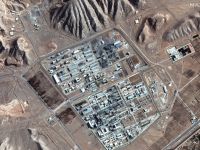By Munir K. Nasser
Washington, DC
A former architect of the Camp David Peace Accords between Egypt and Israel said he is not hopeful that a peace agreement can be reached between Israel and the Palestinians this year.
William Quandt, who has served as a member of the National Security Council in the Nixon and Carter administrations, told Albawaba.com in an interview that a deal is still conceivable, but as each week passes, “the chance of getting a deal this year is less and less.”
Quandt was critical of President Clinton for the remarks he made on Jerusalem this week. “I think that was a big mistake because it runs the risk of backfiring,” he said. He argued if Clinton wants to be a fair-minded mediator, “he got to be careful not to take that kind of one-sided position.”
Quandt gave credit to Barak “for going relatively far on Jerusalem” compared to what many people have expected. He said Barak had a relatively open attitude toward the idea of Palestinian sovereignty over most of the Arab neighborhoods, including the Muslim and Christian quarters in the Old City. “That is all more than most Israelis have ever discussed and offered,” he argued.
Quandt, who was actively involved in the negotiations that led to the Camp David I accords and the Egyptian-Israeli Peace Treaty, warned that if both sides stuck to their bottom line of full sovereignty over the Jerusalem, “there is not going to be any deal.”
In his view, Quandt believes an acceptable compromise to both sides should include “ideas of overlapping sovereignties, shared sovereignties, and shared responsibilities in some areas of the City where the populations have overlapping interests.”
The following are excerpts from the interview:
Q- Are you hopeful that an agreement can be reached between Israel and the Palestinians this year?
A- I guess in all honesty I don’t. I think they came close to an agreement. It is conceivable and still can happen, but as each week passes now, I think the chance of getting a deal this year is less and less. We could still be surprised, but I think it would have to happen very quickly. We have only about four or five weeks before we really have run out of time for this round.
Q- The Camp David summit is now dubbed in the press as the “failed summit.” Do you agree with that characterization?
A- That of course leaves a totally negative impression. It didn’t succeed, and in that sense it was a failure. But I do think that the reports suggest that some important issues were discussed in a fairly constructive way, and that some of the differences were narrowed. They obviously got stuck on one of the hardest of issues, and that’s Jerusalem. But even there, when you have the chance to talk to people who were there about how close they got, it seems to me that the differences were not so great, if what I have been told is accurate. So I would not use the word “failure” myself, even it is technically correct. But I do think it is going to get a lot of work to get negotiations back on track.
Q- How would you describe the Israeli position during the negotiations at Camp David?
A- As you know, I am not an apologist for the Israelis, but I think Barak did go relatively far compared to what many people have expected, including on Jerusalem. I have been told he had relatively open attitude toward the idea of Palestinian sovereignty over most of the Arab neighborhoods, including the Muslim and Christian quarters in the Old City. He was prepared to talk about some shared sovereignty over the Haram Al-Sahrif . That is all more than most Israelis have ever discussed and offered. I can understand why, from Arafat’s point of view, it was still not a basis for an agreement but it also not so far from what one might be able to work with it, that I would say it is all over. I think there are a lot of hard negotiations that lie ahead if both sides still seek an agreement.
Q- It seems everyone in the West is blaming Arafat for the failure of the summit. Could Arafat have gone beyond his red lines?
A- Both sides have red lines. Some of them are more genuinely red than others. I don’t think in a negotiation you can start with the assumption that everything someone described as a red line has to be treated literally as a red line. Obviously Jerusalem is one of the most sensitive areas for red lines. If we accept both parties have defined their bottom line positions as full and unobstructed sovereignty over the City for the Israelis and over the eastern part of the City for the Palestinians, there is not going to be any deal. Who is to blame? I don’t think it is one culprit. The issues themselves are genuinely difficult and had not been adequately discussed before the summit. It is impossible to imagine a problem like Jerusalem being resolved in 48 hours at a summit conference, unless there has been a lot of prior discussion about very concrete plans, and that apparently that hasn’t happened.
Q- What is your view of a compromise that might be acceptable to both sides?
A- I think we need ideas of overlapping sovereignties, shared sovereignties, and shared responsibilities in some areas of the City where the populations have overlapping interests. Unless that kind of thinking can be brought to bear on it, I don’t think we are going to see a solution. Based on what we know now, Arafat was prepared to make significant concessions, for example on security, on Israeli settlements, even on territory, it sounds as if he was fairly flexible.
Q- What do you think of the remarks made by President Clinton on Jerusalem this week?
A- I think that was a big mistake because it runs the risk of backfiring. I don’t think Barak needed that kind of help. It is the kind of statement that American policy makers frequently make, but it’s a kind that can get you into trouble in the diplomacy. Obviously, the Palestinians reacted badly to it, and if Clinton wants to preserve his reputation for possibly being a fair-minded mediator, he got to be careful not to be drawn into either the blame game, or taking that kind of one-sided position. I think if he is going to take positions now, they should be on behalf of compromised positions that he genuinely feels can help solve the problems. I think there is still enough positive feeling about both sides that Clinton hasn’t given up hope that he still can do something before he is out of office.
Q- Do you think Arafat will declare a state unilaterally before September 13?
A- I suppose there will be a lot of pressure on Arafat not to declare a state by September 13. It is understandable that he feels that something needs to be done, but one has to ask the question whether it will advance the overall cause, or whether it is going to set it back. I think at the end of the day, Arafat is a very pragmatic politician and he will ask: ‘what do I actually get for doing this?’ He can get lots of recognition from a 150 states in the world, but if he doesn’t get the recognition from the United States and the European Union, and if doesn’t translate into a real change on the ground, it is going to look like the original declaration of independence in 1988. It did not change anything. It has to have more than words for it to mean anything for the ordinary Palestinians, who have been promised things before. Arafat has to be careful not to have his weakness exposed by making statements that have no consequences.
Q- How do you see the position of the Arab states concerning the lack of support for the Palestinians?
A- I don’t think the main problem in the peace negotiations now is the position of the Arab countries. First and foremost, the Palestinians have to have a feeling that any deal that is offered is at least minimally acceptable in terms of their historic claims. Most Palestinians already feel they had to give up far too much and have got far too little. It is not the Egyptians or the Saudis who have to be satisfied in the first instances; Palestinians have to be convinced that this is the best deal that they can get and it offers at least what one can call minimal justice. And then if they are satisfied with what the practical arrangements are, and if the sensitive issues that touch on Islamic, historic claims can be dealt with, then of course Egypt and Saudi Arabia and other important countries in the region, should be expected to support it. I don’t realistically expect Egypt or Saudi Arabia to pressure the Palestinians to accept something that, frankly, most Arabs and most Muslims are not going to view as a very good deal -- Albawaba.com
© 2000 Al Bawaba (www.albawaba.com)







